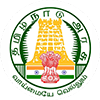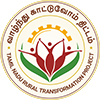The World Bank, the official partner of the Vaazhndhu Kaattuvom Project, provides VKP with regular technical assistance. On September 27, a World Bank team of eight members were given an exposure visit to the Chengalpattu district to study the progress of project activities on the ground and encourage the community members for their efforts. The team split into 2 groups – one going to Padur and the other to Thandarai, both in the Chengalpattu district.
Padur’s Thriving Herbal Garden & Mushroom Farm
The World Bank team, accompanied by the VKP team, headed by CEO Tmt. S. Divyadarshini IAS and COO-PL Thiru. Aruljothi Arasan, visited Padur, Chengalpattu District, and interacted with the beneficiaries about their ongoing activities in the herbal garden and mushroom farm. The mushroom cultivators explained the extensive training & mushroom cultivation process using the Internet of Things (IoT) technology to the team. They currently produce on government-owned land. They plan to increase the size of the production room by integrating more Enterprise Groups and, in future, to start a restaurant serving mushroom products.
Groundnut & Groundnut Extraction in Chengalpattu FPG in Salur
The team next visited the Chengalpattu Farmer Producer Company in Salur Panchayat, where the beneficiaries explained the groundnut procurement process from the Producer Group and the oil extracting process using the required machines. The World Bank team inquired about the oil’s moisture content and the Company’s alternative production strategies. The team encouraged the CEO of the Farmer Producer Collective (FPC) to formulate a business plan for the FPC. VKP-CEO suggested linking the Producer Collectives with Tamil Nadu State Rural Livelihood Mission’s (TNSRLM) Seed Bank to make storage facilities for groundnut seeds, sesame seeds etc.
Value Addition with Thandarai’s Herbal Plants Center, Nursery & Seed Bank
The other World Bank team accompanied by Tmt. Aruna IAS, COO-PM, and other VKP officials visited Thandarai in the Chengalpattu district to monitor the activities of the Irula Tribal Women Welfare Society (ITWWS). The Society produces herbal plants in their nursery and value-added products like custom-made medicines from these herbal plants based on the traditional knowledge of the Irula tribe.
Traditional Healing in Herbal Medicine Centre
At the herbal medicine centre, Mr Jacobs, the CEO of the ITWWS, explained the different medicines and lotions made at the centre for the treatment of diabetes, snake bites, cough, bone rejuvenation, etc., which are custom-made based on the patients’ needs. Patients come here by the word of mouth and are treated by traditional healers.
Natural Herbal Oils from Herbal Seed Bank
The team visited the seed bank located in the same premise where the Producer Collective (PC) stores seeds of over 300 herbal plants. These seeds can be sold to outsiders and the end products are brought back by the PC. The community members demonstrated how they produce their herbal oils, using mostly traditional tools for grinding and mixing with a mix of new machines.
CFS Training in Herbal Garden
At the herbal garden, Thiru. K. Sigamani, who has worked with the community for over 33 years, spoke about the different herbs being cultivated and their various uses. He also takes on the role of a trainer for outsiders in cultivating the plants at the Community Farm School.
Bio-Seed Roll Production Unit
The team visited the bio-seed roll production unit, a novel product maintained by the community members. It resembles an organic flower pot consisting of a blend of bio-manure, bio-enzymes and ash from which native trees and vegetables can be grown. It provides instant nutrients to the plant. The initially time-consuming process has been relatively quickened with the newly acquired machines to create the flower pot mould. The World Bank members each planted one seedling using this bio-seed roll.
 Way-Forward Meeting with The PLF Members
Way-Forward Meeting with The PLF Members
At the discussion with the PLF members, the PLF treasurer Ms Bhuvaneshwari explained the working of the PLF and their decisions for collective action. Mr Jacob presented the way-forward plans of the Society. With 417 members and a 7-member Board of Directors, the Society plans to diversify its products and move into making mainstream products while still retaining traditional ways.
The community plans on making cosmetics, promoting medical tourism with oil, mud massaging with homestay facilities, inviting PhD Students for field visits and collaborating with pharma companies. They also want to create a Herbal Walk Garden for visitors. It was interesting for the World Bank team to find the SHG functioning so effectively without any defaulters. Aspiring men acknowledged it as well, taking loans from the Group to finance their entrepreneurial ventures.
The Irulas have always been a nomadic tribe, travelling from one place to the other, stopping only temporarily at each place. Now owing their own lands, they have finally settled down with only some members still travelling outside the community for work. When asked what they had gained from the PC, the Irula members said it had given them stability and recognition from the Government, and that their community members were getting educated and spreading knowledge to others.
Thiruporur’s Women Livelihood Service Centre
The VKP and World Bank teams visited the Thiruporur Women Livelihood Service Centre (WLSC). The teams interacted with Enterprise Finance Officer and Enterprise Development Officer on the functioning of WLSC, the working of the Matching Grant Scheme and its further follow-ups. They congratulated the Enterprise Community Professionals (ECPs) and asked them to continue their good efforts.
Display of Their Efforts: Visit to Beneficiaries’ Stalls
The highlight of the visit was the stalls of VKP beneficiaries’ products on display. VKP-CEO and COO-PM congratulated the beneficiaries for their tremendous efforts and asked them to keep up the good work. The World Bank team, also appreciating their efforts, advised the members to focus on differentiating their products, addressing supply chain gaps and focusing on labelling products clearly to gain more visibility in wider markets. The products include handicrafts, traditional rice varieties, oil made through traditional methods and value-added food items, among many others.



0 Comments